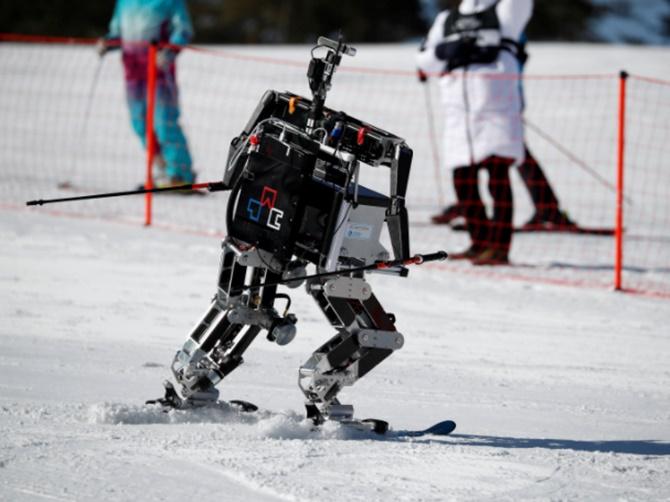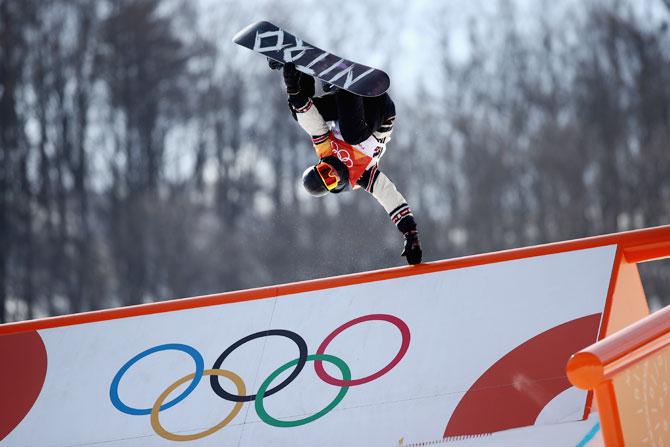
While Alpine skiers fought high winds at the Pyeongchang Games on Monday, there were no such problems for robots competing in their own 'Olympics' ski challenge.
Robots of all shapes and sizes skied, and in some cases tumbled, down a course at the Welli Hilli ski resort, an hour's drive west of Pyeongchang.
Eight robotics teams from universities, institutes and a private company competed for a $10,000 prize in the Ski Robot Challenge.
"I heard the Alpine skiing has been postponed again due to wind conditions. That's a pity," said Lee Sok-min, a member of the winning TAEKWAN-V team.
"Robots are doing fine here," he said.
The teams had to meet specific requirements for entering a ski-bot.
It had to be more than 50cm in height, stand on two 'legs' with joints resembling elbows and knees, have an independent power system and use skis and poles.
The robots were equipped with camera sensors to detect the blue and red flagpoles in their path and turn as they raced down a beginner's hill.
"I'm amazed that the robots recognise the flags as they can ski down while avoiding them," said 12-year-old spectator Son Ki-ryong.
Teams were awarded points for the number of flagpoles avoided and the fastest time to the finish line.
Organisers said they held the challenge to promote South Korea's robotic technology during the Olympics.
"I think in the future robots will have their own Winter Games on the sidelines of the Olympics held by humans," said organiser Kim Dong-uk.
Organisers confirm 177 total norovirus cases

Pyeongchang Winter Olympics organisers (POCOG) said on Monday a total of 177 norovirus cases had been confirmed so far at the Games but that the athletic delegations remained unaffected.
POCOG said 19 new cases of the virus that causes vomiting and diarrhoea had been confirmed as of Sunday afternoon. It added that of the 177 cases, 68 had recovered and had been released from quarantine and returned to work at the Games.
The virus had broken out in the lead-up to the opening ceremony in Pyeongchang last Friday and led to some 1,200 security staff being quarantined. Organisers had to call in military personnel to replace them.
No athletes have been confirmed to have contracted the highly contagious virus. An outbreak at last year's World Athletics Championship in London forced competitors from several countries to miss events.
POCOG has said several agencies were cooperating to stifle the outbreak, with water quality being tested and inspections taking place at venues, restaurants, hotels and worker accommodation.
American Mazdzer stunned by Russian rival's offer
Athletes from the United States and Russia are traditionally fierce adversaries but American Chris Mazdzer, who won a surprise luge Olympic silver medal on Sunday, was blown away by a generous offer from a Russian rival.
"This goes against every Russian-USA stereotype ever but one of the Russian athletes actually wanted me to use his sled because he didn’t think he would come to the Olympics and he wanted to know what it could do," Mazdzer told reporters on Monday.
"That friendship and trust was really moving."
The 29-year-old did not reveal the name of the athlete in question but said the offer came only weeks ahead of the Pyeongchang Games.
"I’m going to keep the name down. It was crazy, happened one morning," added Mazdzer. "It shows we care about each other and there is this human connection which crosses countries and cultures and sport is an amazing way to accomplish it."
Mazdzer finished runner-up to Austrian David Gleirscher at the Olympic Sliding Centre on Sunday to become the first American man to claim a luge medal at the Winter Games.
The silver capped a terrific turnaround from two seasons of frustration, when all his hard work was being undone by a misbehaving sled. Close to despair, he borrowed sleds from other lugers in a bid to understand where he was going wrong.
That willingness to share expensive equipment was typical of the concern the luge community has for each other.
"If you have the fastest equipment, why would you give it to anyone else? Organisations spend millions of dollars in developing the most bad-ass sled fliers you can imagine," he added.
"I developed such strong relationships with people, we travel together for months on end, known them since we were 13, so you build a strong relationship."
And how did he fare with the Russian equipment?
"It didn’t work out, I’m too big for the sled," he said. "I took it down and was out of control."
NBC sack analyst over Japan comment
Joshua Cooper Ramo, the commentator who offended locals during coverage of the Pyeongchang Olympics opening ceremony by straying into the sensitive issue of Japan-South Korean relations, has been taken off the air, US broadcaster NBC said on Monday.
"Joshua Cooper Ramo has completed his responsibilities for NBC in Pyeongchang, and will have no further role on our air," an NBC spokesman said in an email to Reuters.
NBC, a unit of Comcast Corp had announced in December that Ramo would be a contributor at the Games, having previously served as an expert on culture and geo-political issues during the 2008 Beijing Olympics for the network.
Ramo's speaker agency that represents him did not respond to a request for comment.
Ramo, who has written books on China and is a corporate director of Starbucks Corp and FedEx Corp, said as athletes paraded into the Games stadium on Friday that "every Korean will tell you that Japan is a cultural, technological and economic example that has been so important to their own transformation".
Koreans around the world criticised his remarks on social media and a petition soon circulated online.
Japan, which colonized the Korean peninsula from 1910 to 1945, has left a deep legacy of mistrust and ill-feeling in South Korea.
The Pyeongchang Organising Committee (POCOG) had earlier told Reuters that it "informed NBC of the errors in their commentary and the sensitivity of the subject in Korea".
NBC apologised in writing to Pyeongchang's organising committee for the remark, which the committee said it had accepted.












